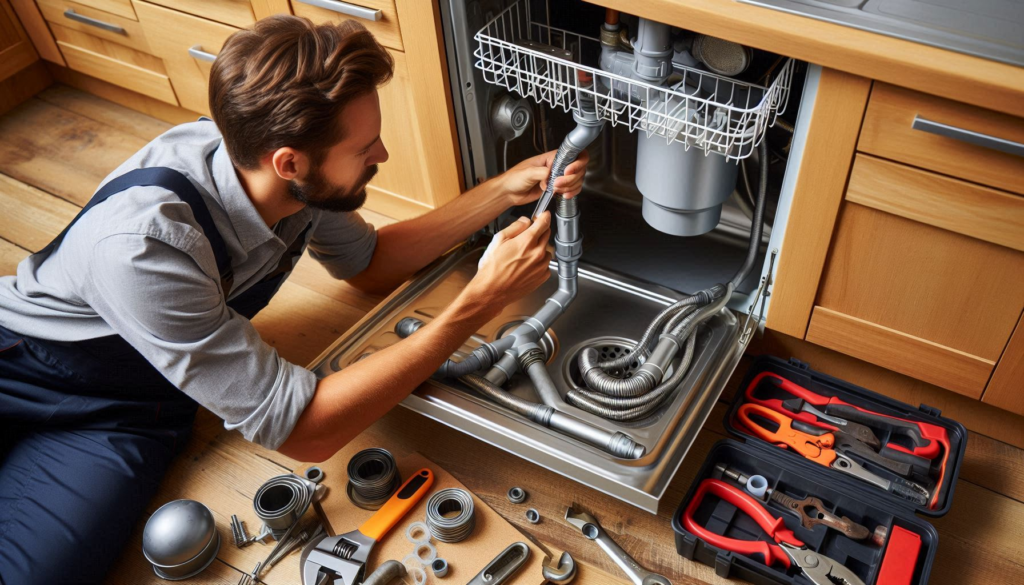Introduction
Ever wondered where all that water goes when you run your dishwasher? Or how it all ties into your kitchen’s garbage disposal system? If you’re a plumber, a plumbing apprentice, or a homeowner looking to understand the mechanics behind these essential kitchen appliances, you’ve come to the right place. In this blog post, we’ll explore whether a dishwasher drain connects to a garbage disposal, the significance of this connection, and what you need to know to keep everything running smoothly.
Understanding the Basics
How a Dishwasher Works
Before we dig into the connection between a dishwasher and a garbage disposal, let’s first understand how each appliance functions individually. A dishwasher essentially uses powerful jets of water and detergent to clean your dishes. The dirty water is then pumped out through a drain hose. Simple, right? But this process can get complicated if food particles clog the drain.
How a Garbage Disposal Works
A garbage disposal is a handy device that grinds up food waste so it can easily be washed down the sink drain. Located beneath your kitchen sink, it uses blades to break down food scraps into smaller pieces. This helps prevent clogs in your plumbing system and keeps your kitchen clean.
Why the Connection Matters
Now that you know how each appliance works, it’s easier to see why their connection matters. The dishwasher drain often connects to the garbage disposal to utilize its grinding capabilities, effectively preventing clogs and ensuring smooth drainage. But how exactly does this connection work?

The Connection
Setting Up the Connection
Connecting a dishwasher drain to a garbage disposal might sound complex, but it’s relatively straightforward if you follow the correct steps. First, ensure that your garbage disposal is installed correctly. Most units come with a designated inlet for the dishwasher drain. This inlet is capped during installation and needs to be knocked out before connecting the drain hose.
Step-by-Step Guide
- Turn Off the Power: Safety first! Make sure to turn off the power supply to both the dishwasher and the garbage disposal.
- Knock Out the Plug: Use a hammer and screwdriver to knock out the plug on the garbage disposal designated for the dishwasher drain.
- Attach the Drain Hose: Connect the dishwasher drain hose to the newly opened inlet on the garbage disposal.
- Secure the Connection: Use a hose clamp to secure the hose in place, preventing any leaks.
- Test the Connection: Turn the power back on and run both appliances to ensure everything is working correctly.
Potential Complications
While the connection process is generally straightforward, complications can arise. For example, if the garbage disposal is not vented correctly, it can cause drainage issues. Always consult with a professional plumber if you encounter any difficulties.
Common Issues and Solutions
Clogs and Blockages
One of the most common issues homeowners face is clogs in the dishwasher drain or garbage disposal. Food particles, grease, and soap scum can build up over time, leading to blockages. Regularly cleaning both appliances and using them properly can help prevent this issue.
Leaks
Leaks are another frequent problem. These usually occur at the connection points. Ensure that all hoses and clamps are securely tightened. If a leak persists, it may be time to replace the hoses or clamps.
Odors
Bad odors can emanate from your dishwasher or garbage disposal due to food particles stuck in the drain. Running a cycle with vinegar or a specialized cleaner can help eliminate these smells. Additionally, grinding citrus peels in the garbage disposal can provide a fresh scent.
Maintenance Tips
Regular Cleaning
Regular cleaning is crucial to keep your dishwasher and garbage disposal in top condition. For the dishwasher, run an empty cycle with a cup of white vinegar once a month. For the garbage disposal, grind ice cubes and citrus peels to clean the blades and freshen the unit.
Avoiding Certain Foods
Certain foods should never go down the garbage disposal. Avoid fibrous vegetables like celery, starchy foods like pasta, and fats or grease. These can easily cause clogs and damage the disposal.
Professional Inspections
Consider scheduling regular inspections with a professional plumber. They can identify potential issues before they become major problems, saving you time and money in the long run.
Final Thoughts
Understanding the connection between your dishwasher drain and garbage disposal not only helps in maintaining these appliances but also empowers you to troubleshoot common issues. Whether you’re a homeowner aiming to keep your kitchen running smoothly or a plumber looking to offer better service, this knowledge is invaluable.
By following the steps and tips outlined in this post, you can ensure that your dishwasher and garbage disposal work harmoniously, preventing clogs, leaks, and other issues. For more personalized advice and professional guidance, consider booking a consultation with an expert plumber today. Happy troubleshooting!